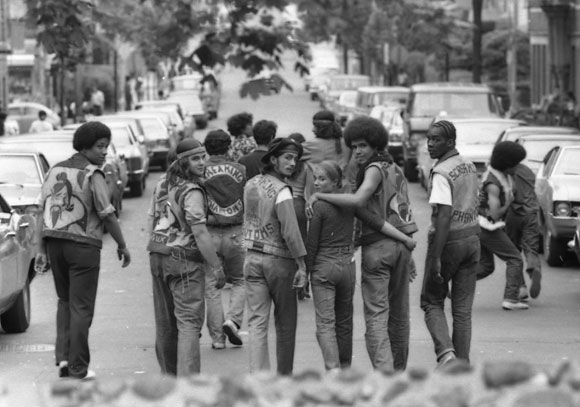Directed by Shan Nicholson.
Starring Benjamin Melendez and Afrika Bambaataa.
Shan Nicholson’s examination of New York street gangs is difficult to categorise. Neither retrospective lovefest nor propaganda fuelled cinematic manifesto. Rubble Kings revels in that grey area which exists between the cracks.
 Using talking heads and newsreel footage he paints across a broad canvas. Whether highlighting the diversity of a nineteen fifties Bronx, where people lived a vibrant, harmonious lifestyle. Or juxtaposing it with the dilapidation which came in the wake of Robert Mose’s Cross Bronx Highway. Nicholson makes Rubble Kings more a rediscovery of identity and family in the wake of a political and cultural upheaval. Framing it in part through reactions to landmark assassinations, Vietnam protests and a country in cultural freefall.
Using talking heads and newsreel footage he paints across a broad canvas. Whether highlighting the diversity of a nineteen fifties Bronx, where people lived a vibrant, harmonious lifestyle. Or juxtaposing it with the dilapidation which came in the wake of Robert Mose’s Cross Bronx Highway. Nicholson makes Rubble Kings more a rediscovery of identity and family in the wake of a political and cultural upheaval. Framing it in part through reactions to landmark assassinations, Vietnam protests and a country in cultural freefall.
Either overlooked or ignored gang culture began as a fraternal bonding exercise. That this would give others a sense of identity, family and values was never the intention. At a time of enormous historical change, gangs sprung up everywhere looking to leave a mark. Nicholson examines how that need for identity was soon overcome by a desire for power. Leading in time to widespread gun use, ritualistic initiations and a loss of reason.
What I get from Rubble Kings is a sense that people were left to rot. An urban wasteland of burnt out buildings, still populated but barely functioning. Combined with the shootings of Martin Luther King, Malcolm X and John F Kennedy, which left a borough in freefall. It is little surprise then that the Bronx rebelled.

Nicholson goes to great pains illustrating reasons for this decline, whether financial, political or otherwise. It’s also interesting to see how the media became a big part in defining that identity, whether through televised debates or concerts. A means of communication which certain members used to spread their opinions, air grievances or simply recruit new members. So powerful were the events which unfolded, that low budget indie flick The Warriors dramatized these events for posterity. However what Rubble Kings possesses which The Warriors now lacks is a sense of immediacy.
The Bronx bloodbath almost happened, someone did get murdered and out of these ashes something constructive was borne. But this is a moment amongst many, captured over ninety minutes to garner profit from one polarising event. Its counterpart is more about the bigger picture.
Many of these people, whether former gang members or otherwise have spent their lives apparently seeking penance. That sense of belonging and wanting others to belong pervades every interview. Although you would hard pressed to call them all dynamic, it is clear they lived through an interesting time.
I realise there has been little discussion of Rubble Kings as either film or documentary here. I have not gone into the relative merits in any great depth. That is because these things are best discovered for yourself. My opinion should in no way colour your own judgement, not of this. There will be those who would wish to label me a critic and expect me to criticise. In the case of Rubble Kings I forego that privilege. Some things are best discovered alone without the opinion of others. Take from that what you will.



